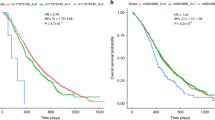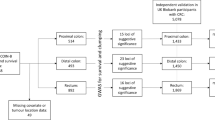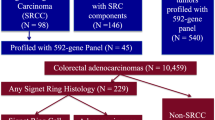Abstract
Copy neutral loss of heterozygosity (cnLOH) is a common event in several human malignancies—positing this as a mechanism of carcinogenesis. However, the role of cnLOH in synchronous colorectal cancer (SCRC), a unique CRC subtype, is not well understood. The aim of this study was to establish a cnLOH profile of SCRC using a single-nucleotide polymorphism array (SNP-A), and to explore associations between cnLOH and the genomic landscape of frequently mutated genes in SCRC. Among 74 paired SCRC cases, the most frequently altered regions were 16p11.2–p11.1 (59.5%) and 11p11.2–p11.12 (28.4%). Notably, the 6q11.21–q11.22 region altered by cnLOH was uniquely associated with polyclonal SCRCs (p = 0.038). Together, our analysis suggests that inactivation of tumor suppressor genes and cnLOH are rare events among SCRC cases. This study defines distinct patterns of cnLOH in SCRC, and provides initial evidence of a role for cnLOH in SCRC etiology.
This is a preview of subscription content, access via your institution
Access options
Subscribe to this journal
Receive 12 print issues and online access
$259.00 per year
only $21.58 per issue
Buy this article
- Purchase on SpringerLink
- Instant access to the full article PDF.
USD 39.95
Prices may be subject to local taxes which are calculated during checkout

Similar content being viewed by others
References
Bray F, Ferlay J, Soerjomataram I, Siegel RL, Torre LA, Jemal A. Global cancer statistics 2018: GLOBOCAN estimates of incidence and mortality worldwide for 36 cancers in 185 countries. CA Cancer J Clin. 2018;1–31.
Lam AKY, Chan SSY, Leung M, Lam AKY, Chan SSY, Leung M. Synchronous colorectal cancer: clinical, pathological and molecular implications. World J Gastroenterol. 2014;20:6815–20.
Lochhead P, Chan AT, Nishihara R, Fuchs CS, Beck AH, Giovannucci E, et al. Etiologic field effect: reappraisal of the field effect concept in cancer predisposition and progression. Mod Pathol. 2015;28:14–29.
Beroukhim R, Mermel CH, Porter D, Wei G, Raychaudhuri S, Donovan J. et al. The landscape of somatic copy-number alteration across human cancers. Nature. 2010;463:899–905.
Song F, Li X, Song F, Zhao Y, Li H, Zheng H. et al. Comparative genomic analysis reveals bilateral breast cancers are genetically independent. Oncotarget. 2015;6:31820–9.
Perea J, García JL, Corchete L, Lumbreras E, Arriba M, Rueda D, et al. Redefining synchronous colorectal cancers based on tumor clonality. Int J Cancer. 2018;144:1596–608.
Torabi K, Miró R, Fernández-Jiménez N, Quintanilla I, Ramos L, Prat E. et al. Patterns of somatic uniparental disomy identify novel tumor suppressor genes in colorectal cancer. Carcinogenesis. 2015;36:1103–10.
Makishima H, Maciejewski JP. Pathogenesis and consequences of uniparental disomy in cancer. Clin Cancer Res. 2011;17:3913–23.
Tuna M, Smid M, Zhu D, Martens JWM, Amos CI. Association between acquired uniparental disomy and homozygous mutations and HER2/ER/PR status in breast cancer. PLoS ONE. 2010;5:e15094.
Torabi K, Erola P, Alvarez-Mora MI, Díaz-Gay M, Ferrer Q, Castells A, et al. Quantitative analysis of somatically acquired and constitutive uniparental disomy in gastrointestinal cancers. Int J Cancer. 2019;144:513–24.
Andersen CL, Wiuf C, Kruhøffer M, Korsgaard M, Laurberg S, Ørntoft TF. Frequent occurrence of uniparental disomy in colorectal cancer. Carcinogenesis. 2007;28:38–48.
Redaelli S, Maitz S, Crosti F, Sala E, Villa N, Spaccini L, et al. Refining the phenotype of recurrent rearrangements of chromosome 16. Int J Mol Sci. 2019;20:1–17.
Bochukova EG, Huang N, Keogh J, Henning E, Purmann C, Blaszczyk K. et al. Large, rare chromosomal deletions associated with severe early-onset obesity. Nature. 2010;463:666–70.
Cheng Y, Duan C, Zhang C. New perspective on SH2B1: an accelerator of cancer progression. Biomed Pharmacother. 2020;121:109651.
Maity G, Haque I, Ghosh A, Dhar G, Gupta V, Sarkar S, et al. The MAZ transcription factor is a downstream target of the oncoprotein Cyr61/CCN1 and promotes pancreatic cancer cell invasion via CRAF–ERK signaling. J Biol Chem. 2018;293:4334–49.
Yang Q, Lang C, Wu Z, Dai Y, He S, Guo W, et al. MAZ promotes prostate cancer bone metastasis through transcriptionally activating the KRas-dependent RalGEFs pathway. J Exp Clin Cancer Res. 2019;38:1–17.
Triner D, Castillo C, Hakim JB, Xue X, Greenson JK, Nuñez G, et al. Myc-associated zinc finger protein regulates the proinflammatory response in colitis and colon cancer via STAT3 signaling. Mol Cell Biol. 2018;38:1–15.
Di J, Yang H, Jiang B, Wang Z, Ji J, Su X. Whole exome sequencing reveals intertumor heterogeneity and distinct genetic origins of sporadic synchronous colorectal cancer. Int J Cancer. 2018;142:927–39.
Hänninen UA, Wirta EV, Katainen R, Tanskanen T, Hamberg J, Taipale M, et al. Exome and immune cell score analyses reveal great variation within synchronous primary colorectal cancers. Br J Cancer. 2019;120:922–30.
Sanada M, Suzuki T, Shih LY, Otsu M, Kato M, Yamazaki S. et al. Gain-of-function of mutated C-CBL tumour suppressor in myeloid neoplasms. Nature. 2009;460:904–8.
Acknowledgements
We thank the Tumor Registry of the Pathology Department of the 12 University Hospital, Madrid.
Funding
This work was funded by Projects PI16/01650 to JP, and PI16/01920 to RG-S, from the Spanish Ministry of Health and Consumer Affairs and FEDER, by Project 2012-0036 from the Mutua Madrileña Foundation. ANH was supported by the National Institutes of Health K12 HD043483 from the Eunice Kennedy Shriver National Institute of Child Health and Human Development.
Author information
Authors and Affiliations
Corresponding author
Ethics declarations
Conflict of interest
The authors declare that they have no conflict of interest.
Additional information
Publisher’s note Springer Nature remains neutral with regard to jurisdictional claims in published maps and institutional affiliations.
Supplementary information
Rights and permissions
About this article
Cite this article
Tapial, S., García, J.L., Corchete, L. et al. Copy neutral loss of heterozygosity (cnLOH) patterns in synchronous colorectal cancer. Eur J Hum Genet 29, 709–713 (2021). https://doi.org/10.1038/s41431-020-00774-w
Received:
Revised:
Accepted:
Published:
Version of record:
Issue date:
DOI: https://doi.org/10.1038/s41431-020-00774-w
This article is cited by
-
P53 loss of heterozygosity (LOH) in formalin-fixed paraffin-embedded leiomyosarcoma (LMS): a novel report
Irish Journal of Medical Science (1971 -) (2024)
-
Loss of heterozygosity related to TMB and TNB may predict PFS for patients with SCLC received the first line setting
Journal of Translational Medicine (2021)



